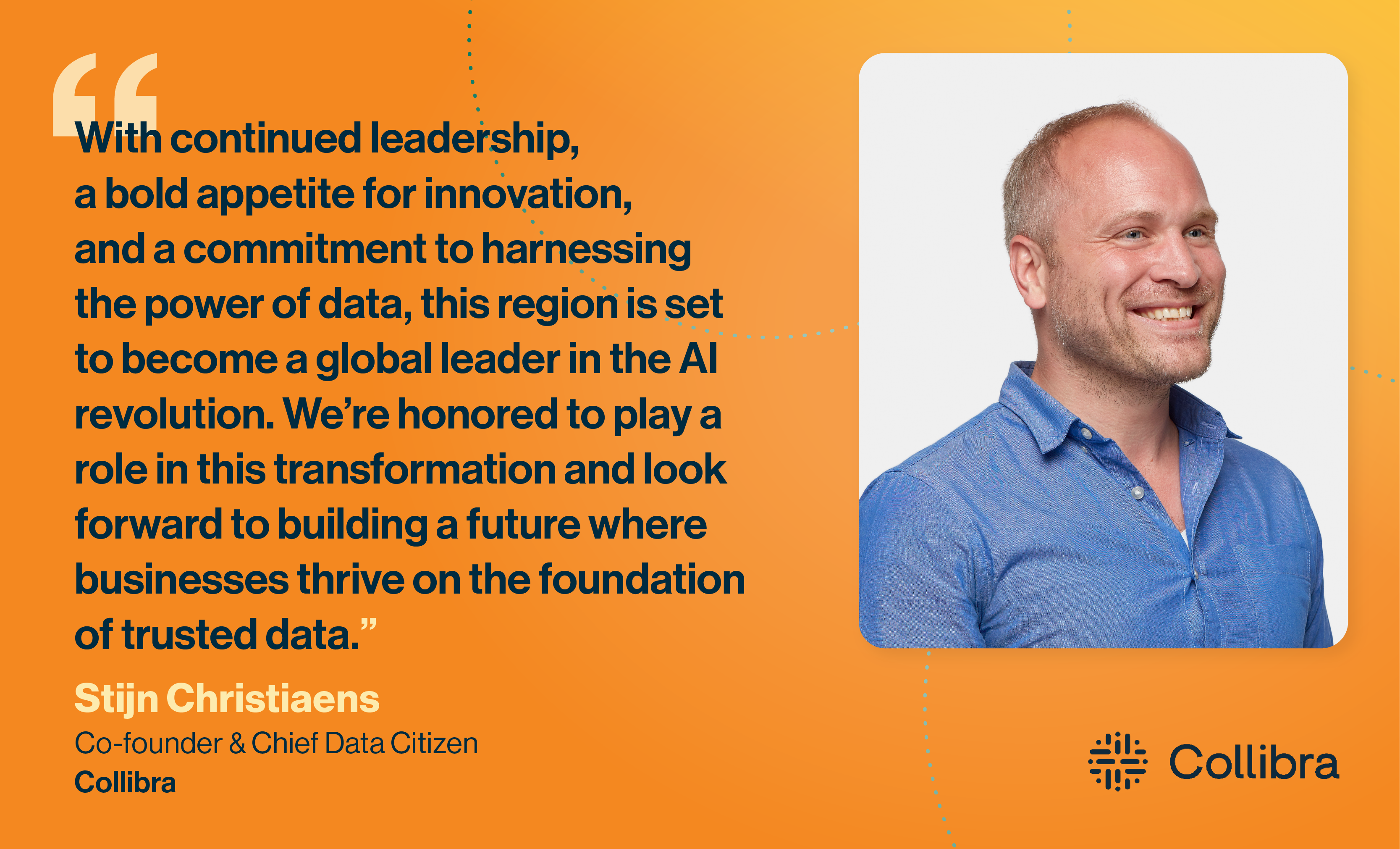Today, it’s commonplace to say that data is the lifeblood of our digital age. In healthcare, it’s a useful metaphor; data and the decision-making it drives is essential for positive patient care and healthcare innovation.
However, as the industry becomes increasingly reliant on data—especially as more AI is integrated into technology and business roadmaps—the challenge for governance and data professionals continues to be: How do we ensure healthcare providers and patients trust the data so critical to organizational goals and patient outcomes?
In the era of “intelligent health,” the seamless flow of trustworthy data becomes essential. Yet data silos, privacy concerns and quality inconsistencies threaten progress. Overcoming these challenges requires governance that can effectively create a culture of trusted data.
Ready for data governance? See how Collibra is ready for you too.
It’s time to care about governance
It’s clear. “Intelligent health” delivers improved outcomes. And it’s enabling personalized, actionable insights that improve clinical performance, operational efficiency and patient experience.
However, the journey toward intelligent health can often reveal gaps in traditional data environments and a lack of preparation for the demands (and risks) of a newer AI-fueled landscape.
In fact, many healthcare systems rely on legacy architectures that struggle to manage the dynamic, real-time nature of modern data needs.
Effective data governance mitigates the challenges created by:
- Data silos and interoperability
- Ethical considerations around AI
- Regulatory compliance
Data silos and interoperability
Healthcare data resides across various systems, including hospitals, insurance providers, research institutions and government agencies. (And, as Elon Musk’s recent invitation for people to upload their health records to X demonstrates, AI may significantly affect this landscape.)
Such fragmentation creates data silos that inhibit sharing and collaboration, often resulting in incomplete or inconsistent patient records. For instance, a patient receiving care from multiple providers may experience delays or errors due to the lack of a unified data view.
To address these issues, organizations are implementing data fabric architectures that unify disparate data sources. (A data fabric enables seamless access and integration of data, creating a consistent and holistic view across systems.) Additionally, adopting interoperability standards such as FHIR (or Fast Healthcare Interoperability Resources) ensures data flows freely and securely across platforms, following patients throughout the Care journey.
In addition to integrating technical solutions, fostering a culture of collaboration and data-sharing among stakeholders is essential. Governance frameworks provide clear guidelines for data exchange, helping organizations overcome cultural resistance and prioritize patient-centric outcomes. By breaking down silos, healthcare providers can improve continuity of care, streamline operations and enhance decision-making.
Ethical considerations around AI
The integration of AI into healthcare is revolutionizing areas such as diagnostics, personalized medicine and operational efficiency. However, it also amplifies the need for ethical governance.
Without proper oversight, AI systems can perpetuate biases inherent in training data, leading to unequal outcomes. An AI governance framework ensures ethical principles are embedded into the design, development and deployment of AI systems. Key components include:
- Bias mitigation: Regularly auditing training datasets for representativeness and fairness
- Transparency and accountability: Documenting AI models, decision-making processes, and intended use cases to foster trust
- Continuous monitoring and adaptation: Tracking AI performance over time to detect and address emerging issues, such as data drift or unexpected biases
Learn more about Collibra AI Governance.
Regulatory compliance
The healthcare sector operates within a complex regulatory framework designed to protect patient privacy and ensure data security. Regulations such as HIPAA impose strict requirements on how healthcare organizations handle sensitive data. Failure to comply can result in severe legal, financial, and reputational consequences.
Data governance frameworks provide the tools and processes needed to navigate these regulations effectively. Key practices include:
- Data classification and cataloging: Identifying and organizing data assets to ensure sensitive information is handled appropriately.
- Access controls and encryption: Restricting data access to authorized personnel and protecting data at rest and in transit.
- Auditing and reporting: Maintaining detailed records of data usage and governance practices to demonstrate compliance during audits.
By embedding compliance into your data governance strategies, healthcare organizations can reduce risk, build patient trust and create a strong foundation for innovation.
What you need is a little trust
At Collibra, we think a lot about the technical side of the data governance experience. However, we know that for organizations to cultivate a healthy data culture, there’s one feeling that is critical. Trust.
Trust that your data is accurate, consistent and responsibly managed is the most-effective way to ensure your organization gets the most out of data. Today, trust remains essential, especially confidence about data integrity.
There’s no getting around it. If you want to accelerate innovation and improve outcomes, while mitigating risks, integrating data and AI governance is now table stakes, providing a repeatable, scalable framework for managing your AI roadmap—from planning to deployment.
The prescription for smarter healthcare: unified governance for data and AI
As healthcare marches toward the vision of “intelligent health,” the stakes for data-driven innovation have never been higher. But success requires more than advanced technology—it demands a foundation of trustworthy, well-governed data and AI.
Data silos, interoperability challenges and ethical considerations can stall progress. And as AI spurs the re-imagining of healthcare, governance becomes critical. With frameworks that ensure fairness, transparency and accountability, healthcare organizations can create a culture of trusted data and effective AI.
Collibra Platform can help your healthcare organizations unify data and AI governance, providing visibility and control across every system. By fostering trust in your data, Collibra helps accelerate innovation, maintain compliance and deliver better outcomes.
You can transform patient care, streamline operations, and realize the promise of intelligent health.
Take the next step.
Learn more about Collibra Data Governance and Collibra AI Governance.




